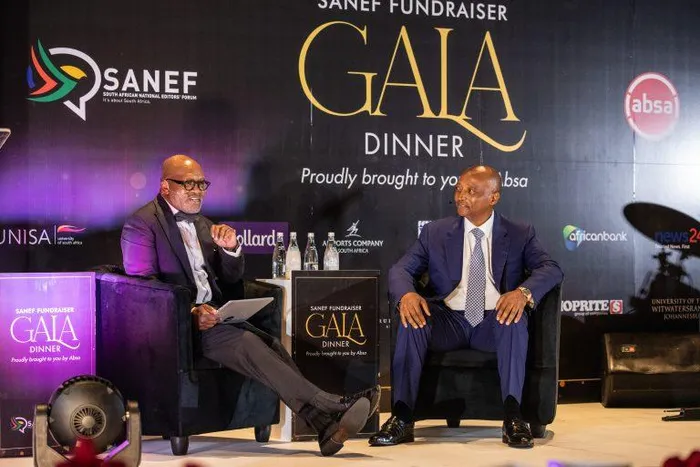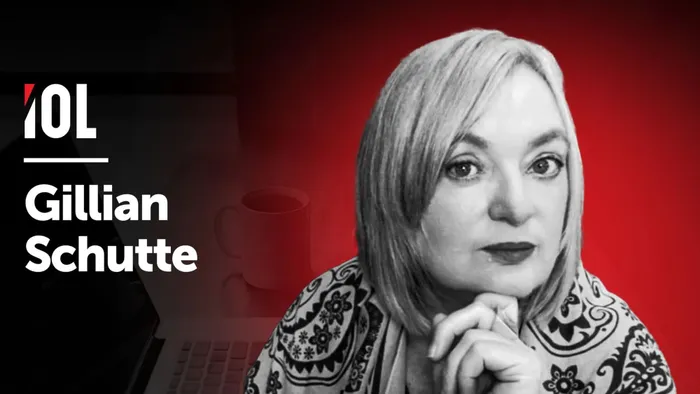Celebrating Elitism: The Gala of Gatekeepers and Its Impact on Media Freedom

Vuyo Mvoko and Patrice Motsepe on stage at the lavish SANEF fundraiser gala dinner, held in Houghton conspicuously close to Black Wednesday.
Image: X.com / SANEF
SANEF’s (The South African National Editors' Forum) Houghton Hotel soirée wasn’t a defence of media freedom — it was a high-end ritual celebrating South Africa’s information elite. Picture it: editors, bankers, billionaires, and brand managers sipping champagne beneath chandeliers, congratulating each other for “protecting democracy.” The sponsor list reads like a stock exchange roll call — Absa, FNB, Nedbank, Discovery, Multichoice, Telkom, Shoprite, News24, ACSA, African Bank, Hollard, TikTok, and the ever-obliging UNISA to sprinkle academic incense over the altar. It was less a fundraiser than a sermon preached by capital to itself.
The rhetoric was dripping with sanctimony. SANEF’s chair thundered about “mis and disinformation” and invoked the M20 Declaration to demand fair compensation for journalism “feeding AI systems.” Corporate piety presenting as moral clarity. Then came the obligatory genuflection: “We are grateful to have corporate citizens joined at the hip with us.” Joined at the hip — the perfect metaphor. Journalism shackled to its funders, mistaking dependence for partnership. Absa’s Christine Wu even delivered the sermonette of the evening: “Trust is our most valuable currency.” Of course it is. Banks have always been experts at manufacturing trust out of debt. Now they are minting credibility the same way, through sponsored truth.
The irony could power Eskom. A media forum crying about the erosion of truth while thanking the very architects of economic inequality for underwriting the evening. Freedom of the press, sponsored by the same financial houses that keep South Africans tethered to debt and despair. A “defence of truth” hosted by those whose profits depend on illusion. These people don’t defend the truth. They market it, polish it, and sell it back to the public as a premium product.
And who better to headline this grotesque spectacle than Dr. Patrice Motsepe — mining tycoon, billionaire philanthropist, and now patron saint of ethical capitalism. He took the stage to assure the nation he has no political ambitions — as if South Africans were lying awake at night terrified of being ruled by yet another billionaire with divine aspirations. He declared that South Africa doesn’t need a rich man as president. How touching. The audience applauded, relieved to know their spiritual leader will continue (not) saving the poor from a safe distance. Then, with polished humility, he told us that the private sector drives progress and that a “developmental state” should care for the marginalised. Translation: capital will keep the spoils; government can feed the leftovers to the hungry.
This is the gospel of our times — neoliberal salvation calling itself change and pretending to be social justice. A mining magnate preaching unity while his industry poisons rivers and land. A media guild, financed by banks, calling itself a guardian of integrity. An entire class of elites posing as midwives of democracy while quietly strangling it in its crib.
The audience clapped for every line about the “information crisis” without recognising they are its main curators. News24 sits among the sponsors while waging war against independent outlets, labelling any dissent as “misinformation.” TikTok — a surveillance empire disguised as entertainment — is applauded for its “commitment to media freedom.” And UNISA lends its intellectual stamp, performing the role of the respectable aunt at the family crime scene.
Meanwhile, the real journalists — those in Gaza, in mining towns, in shack settlements — were absent. And so too were the writers and editors of Independent Media and IOL, along with their chair, Dr Iqbal Survé — the most maligned media owner in the country, helming what is arguably South Africa’s most diverse and far-reaching media platform. Their absence was deliberate. They were airbrushed out of the SANEF pantomime, relegated to Marvel comic villain status because they fearlessly challenge the toxic, sold-out media ecosystem that SANEF’s patrons defend. The fact that an entire national media network and its journalists are shunned for exposing hypocrisy tells you everything about who is allowed into this sanctified circle and who is punished for refusing to kneel.
There was no mention either of the South African journalists who recently flew to Israel for “training” junkets — propaganda tours purported to be educational excursions — funded by the very state currently bombing newsrooms and killing reporters. The audience might have choked on their dessert if reminded of that hypocrisy.
The event’s timing, near the anniversary of Black Wednesday, adds another layer of absurdity. That day once symbolised resistance to state censorship. Now it’s commemorated by editors clinking glasses with bankers. The tools of control have simply changed — no more government bans, just corporate sponsorships, NGO partnerships, and algorithmic visibility rankings. Censorship outsourced to polite society.
Frankly speaking, to quote Biko, when banks fund your watchdog, it won’t bite them. When mining billionaires deliver your keynote, environmental journalism becomes polite chatter about “balance.” When media houses bankroll SANEF, independent competitors become targets of smear campaigns dressed as “ethics.” Every clause of this moral farce was visible at Houghton. The press that once imagined itself the conscience of the nation now performs as its carnival clowns— a grotesque performance of virtue designed to reassure the powerful that their narrative still reigns supreme.
If SANEF were serious about defending media freedom, the tables would look different. There’d be freelancers suing for payment, township journalists dodging bullets, Gaza correspondents with scars, and columnists banned from mainstream platforms for naming empire. They’d demand transparency on all foreign-funded media platforms and publish who pays for what “training.” Instead, we get self-congratulation and selfie backdrops. It’s a masquerade of integrity sponsored by power.
South Africa doesn’t need another gala for truth. It needs a press that can survive without begging at the feet of banks and morally bankrupt billionaires. It needs media willing to tear up the invitations to these elitist events and tell the truth without permission. The real defenders of media freedom aren’t sipping wine at the Houghton Hotel. They’re writing on borrowed laptops, dodging lawsuits, and refusing to stay silent. They know that truth isn’t a product to be funded or branded. It’s a sword of truth — and they still know how to use it.

South Africa doesn’t need another gala for truth. It needs a press that can survive without begging at the feet of banks and morally bankrupt billionaires, writes Gillian Schutte.
Image: IOL
* Gillian Schutte is a South African writer, filmmaker, poet, and uncompromising social justice activist. Founder of Media for Justice and co-owner of handHeld Films, she is recognised for hard-hitting documentaries and incisive opinion pieces that dismantle whiteness, neoliberal capitalism, and imperial power.
** The views expressed do not necessarily reflect the views of IOL or Independent Media.
Related Topics: